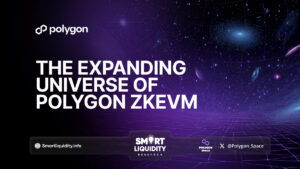The Future of Multichain Identity


As Web3 continues to evolve, one of its most critical challenges—and opportunities—is identity. In a decentralized world, how can individuals seamlessly manage and prove their identity across different blockchains? Enter the concept of multichain identity, and at the forefront of this innovation is the Polygon network.
What Is Multichain Identity?
A multichain identity refers to a unified digital identity that spans multiple blockchain ecosystems. Rather than having separate wallets, usernames, or credentials on Ethereum, BNB Chain, Avalanche, and others, users can operate with a single interoperable identity. This enables seamless interactions across DeFi, NFTs, DAOs, and other dApps—without repeated verification or redundant sign-ins.
Why Multichain Identity Matters
In Web2, platforms like Google or Facebook provide single sign-on (SSO) functionality. But in Web3, decentralization makes identity fragmented. You might have:
A MetaMask wallet on Ethereum
A Phantom wallet on Solana
A Lens profile on Polygon
An ENS domain, but only usable on Ethereum
This fragmentation limits true interoperability. A multichain identity solves this by linking these identities into one verifiable, secure persona. It allows users to maintain reputation, credentials, and social graphs across ecosystems.
Polygon’s Role in Multichain Identity
Polygon is strategically positioned to lead the multichain identity space. Here’s why:
1. Scalability and Accessibility
Polygon’s low fees and fast transaction speeds make it ideal for high-frequency identity-related operations. Identity systems often require multiple smart contract calls—for attestations, verifications, or profile updates—which are impractical on high-fee chains like Ethereum mainnet.
2. ZK-Powered Privacy
With the launch of Polygon zkEVM and ongoing developments in zero-knowledge proofs, Polygon is laying the groundwork for privacy-preserving identity. Users can verify aspects of their identity—like age or credentials—without exposing their full data, ensuring compliance with privacy standards like GDPR.
3. Decentralized Identity (DID) Protocols
Projects such as Polygon ID are pioneering decentralized identity on-chain. Polygon ID leverages ZK proofs to allow users to create cryptographically secure, self-sovereign identities that can be used in Web3 apps and even traditional sectors like finance or education.
4. Interoperability via Aggregation
As Polygon evolves into a layer-2 aggregator, connecting multiple chains and rollups, it becomes the perfect bridge for identity data. Users might log into an Arbitrum-based dApp using credentials stored or verified on Polygon. This cross-chain synergy will be essential in a multichain world.
Real-World Use Cases
Here’s how multichain identity on Polygon is likely to shape the future:
Cross-chain DeFi credit scores – Users build borrowing history on one chain, but apply for credit elsewhere.
Universal NFT ownership – Showcase and verify NFT ownership across ecosystems via a single identity.
DAO participation – Use your Polygon-based credentials to vote in DAOs on other chains.
KYC in TradFi – Users can undergo KYC once and share ZK-proof-based verification across multiple platforms.
Challenges Ahead
While the potential is vast, several challenges remain:
Standardization – Creating universally accepted identity formats is critical.
Security – A unified identity becomes a prime target; safeguarding it is non-negotiable.
Adoption – dApps must integrate with identity providers like Polygon ID to create a usable ecosystem.
Final Thoughts: The Road Ahead
Polygon is not just building infrastructure—it’s shaping the identity layer of Web3. Through its scalable architecture, zero-knowledge capabilities, and decentralized identity initiatives, it’s enabling a future where users control their digital identity across all chains.
As multichain identity becomes a cornerstone of Web3 UX, expect Polygon to lead the way—making decentralized identity not only possible, but powerful.
REQUEST AN ARTICLE
Disclaimer:
This article is for informational purposes only and does not constitute financial advice. Readers are encouraged to conduct their own research and consult with a financial professional before making any investment decisions.




